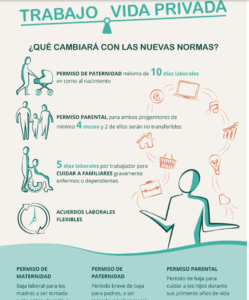The European Parliament is voting on new rules to allow parents and carers to better reconcile their work and family lives.
More adaptable working conditions and family and care-related leave would help working parents and carers balance private and professional interests and avoid the need to choose between family and career. They form part of the EU’s social policies to improve people’s lives and well-being.
The impact on gender equality
Women, whose employment rate was 66.5% (compared to 78% for men) in 2017, are far more likely to work part-time to take care of children and relatives and face career interruptions, which contribute to them being paid on average less and having lower pensions than men.
The new rules for a better work-life balance aim to increase women’s employment rate, create incentives for fathers to take family-related leave and promote gender equality and equal opportunities.
Main elements of the new rules
- The legislation would set new or higher minimum standards for parental and carers’ leave.
- Fathers would be entitled to at least 10 working days’ paternity leave, paid at least at the level of sick pay. This would also apply to equivalent second parents, where recognised by national laws.
- People would have the right to at least four months of parental leave, of which two months are non-transferable and paid. The level of compensation would be set by EU countries.
- Workers looking after seriously ill or dependent relatives could claim five days of carers’ leave a year.
- In addition parents and carers would benefit from improved rights to request flexible working arrangements, for example flexible or reduced working hours.
More information
Access the complete news
Related Document: Work-life balance: What are the benefits?
Briefing: a new directive on work-life balance
Infographic: maternity and paternity leave in the EU (March 2019)







Leave a Reply